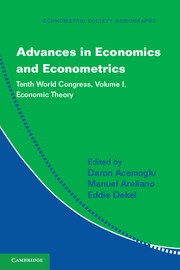Book contents
- Frontmatter
- Contents
- Contributors
- Preface
- I NONSTANDARD MARKETS
- II CONTRACTS
- III DECISION THEORY
- IV COMMUNICATION/ORGANIZATIONS
- V FOUNDATIONS: EPISTEMICS AND CALIBRATION
- VI PATENTS: PROS AND CONS FOR INNOVATION AND EFFICIENCY
- 15 Revisiting the Relationship between Competition, Patenting, and Innovation
- 16 Mechanisms for Allocation and Decentralization of Patent Rights
- Name Index
- Miscellaneous Endmatter
16 - Mechanisms for Allocation and Decentralization of Patent Rights
Published online by Cambridge University Press: 05 May 2013
- Frontmatter
- Contents
- Contributors
- Preface
- I NONSTANDARD MARKETS
- II CONTRACTS
- III DECISION THEORY
- IV COMMUNICATION/ORGANIZATIONS
- V FOUNDATIONS: EPISTEMICS AND CALIBRATION
- VI PATENTS: PROS AND CONS FOR INNOVATION AND EFFICIENCY
- 15 Revisiting the Relationship between Competition, Patenting, and Innovation
- 16 Mechanisms for Allocation and Decentralization of Patent Rights
- Name Index
- Miscellaneous Endmatter
Summary
Introduction
Innovation is one of the centerpieces of an economy, and many generations of economists have discussed how best to promote it. Whether the allocation of market power (e.g., through a patent) is necessary has been subject to a heated debate that dates back to at least Smith (1762) and Mill (1848). Schumpeter (1942) claimed that monopoly rents are a necessary evil in encouraging innovation. On the contrary, Boldrin and Levine (2008) suggested that the current intellectual-property-rights system is not an effective tool to generate innovation while it generates numerous distortions.
The allocation of market power through a patent is a classical way to provide incentives to innovate. It typically is argued that fifteenth-century Venice and seventeenth-century Britain created the first two patent systems. However, patents have not been the only way to provide incentives to innovate. Prizes awarded to firms that come up with innovations also have been a common mechanism used by governments to spur innovation. Finally, governments might allocate research contracts to private firms to produce an innovation.
As discussed, for example, in Wright (1983) whether either system is optimal greatly depends on the balance between their different distortions. Market power relates the profits that firms obtain with the contribution of their innovation but at the cost of the dead-weight loss generated by an inefficient allocation. Prizes or government contracts, to the extent that they make knowledge public, generate no dead-weight loss, but they require enormous amounts of information that typically are not available.
- Type
- Chapter
- Information
- Advances in Economics and EconometricsTenth World Congress, pp. 456 - 486Publisher: Cambridge University PressPrint publication year: 2013



